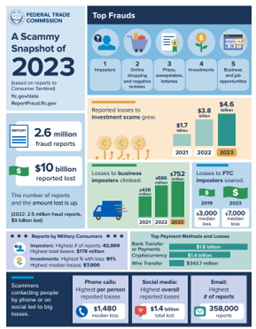Posted On: June 26, 2024 by Prevail Bank in: Banking / Money Management Fraud

Want a job? Watch out for the You’re hired! scams.
It is so frustrating. You’re trying to contribute to society by finding gainful employment; you have hopes and dreams of a successful career. And just when you think you found an opportunity that is flexible and allows you to work from home… you’ve been scammed!
Scammers post fraudulent job postings to trick applicants into providing personal information or money. The FBI posted a public service announcement in 2022 that said since early 2019, the average reported loss related to job scams is nearly $3,000 per victim. Many victims reported negative credit score impacts as well. According to the Federal Trade Commission, Business and job opportunity scams made the TOP 5 FRAUDS list in 2023.
Job scams are most prevalent….
- Shortly after the holidays because people have intentions, resolutions of starting anew.
- For those between the ages 18-34 and students because they are looking for cash on the side or a way to make money fast for tuition.
- In geographic areas where there were large layoffs. Scammers know these individuals will be desperate to make money.
- And for anyone looking for remote (work from home) job opportunities. This type of employment is a hot bed of opportunity for scammers.
What are the red flags / tactics of job scammers?
- It is true that before you start a job, you will need to give your employer your social security number. And since most companies pay salaries via direct deposit, you will eventually need to share your banking information too. BUT, if the company (or a recruiter who claims to have found your resume on a job board) is asking you for this information early (IE: your social security number or bank account information before a job offer), you’re most likely being scammed.
- Recruiting through social media and chat channels is a flag. According to FlexJobs, scammers use instant messaging services, like Telegram or WhatsApp, to communicate and conduct fake job interviews with job seekers. Most legitimate companies don’t seek new employees through social media.
- You can’t find any info about the company. Real companies will have an online presence, with contact information, phone numbers, and locations identified. Real companies have some social media engagement with a decent following. If the company offering you your dream job doesn’t have the above or the information is scant, they may not be legitimate.
- If you are asked to send money for equipment needed to perform a work-at-home job before you start working, with the explanation that you will be reimbursed in your first paycheck – you’re most likely being scammed.
- If someone asks you to pay to get a job or to pay a fee to complete an application, that’s a scam. Honest job placement agencies, headhunters, and recruiters do not typically charge a fee to job candidates. The hiring company pays them. You don’t have to pay a fee to acquire a government job either. Use the official government websites to find and apply to those jobs: USAJobs.gov or usps.com/employment.
- If they want you to deposit a check and then send money back (because they supposedly overpaid by accident), that’s a sign of a fake check scam. Or, they want you to deposit a check and use those funds to buy equipment. Know that by the time the bank figures out the check is no good, the scammer is no where to be found and you will be responsible for the dollars involved.
- Scammers may pose as a career consultant or resume/interview expert who can optimize your chances for a position. For a fee, they promise information to help you prepare for an interview and acquire the job you want at a select company. Essentially this information is available through free sources on the web.
- A recruiter contacts you first, usually by stating they found your resume online. While this doesn’t necessarily mean this person isn’t who they claim to be, be immediately wary if you receive a job offer right away or there are unusual requests for personal information.
- Scammy recruiters will email you from a personal email (@gmail.com or @yahoo.com), not a company account. Or, they will ask you to install an unfamiliar app to apply for a position.
- You’re invited to an interview (for a job you never applied for). The job sounds interesting, you’re interested, BUT when it come times for the online interview, the messaging service that’s being utilized wants you to input personal information to complete the setup. Don’t do it!
- Scammers will claim that an examination of your credit history is necessary to determine if you are financially responsible and you need to pay for it with a credit card. If you fall for this, you can almost anticipate other charges and fees being charged against your card. Real employers do sometimes perform credit checks on employees, but they cover the cost.
- You receive an email saying that you are eligible to apply for a ‘career advancement grant’ from the government; the grant will cover your costs of obtaining a higher education or additional professional development. This is a scam. According to the Federal Trade Commission (FTC), the government never sends unexpected communications about grant opportunities.
- An immediate offer to work without having applied, without an interview, without speaking to anyone is a huge red flag. Or, you are offered a job after an alarmingly short interview or the interview is with a ‘mystery company’.
- If the pay is extremely high or the schedule seems ‘too’ flexible – it most likely is a scam. The saying, “If it is too good to be true, it most likely is,” holds true. Example: If an entry-level job pays $75,000 for 15-20 hours of work per week, or the ad uses the phrases: quick money, unlimited earning potential – it’s likely a scam.
- Real job opportunities have very specific job details and requirements. If the posting you’re reading is vague or requires only that you be of legitimate age, can read and type, etc. – be wary.
- The job is endorsed by celebrities or public figures.
- The job is based on you recruiting people to join you.
- If you come across a job that you must accept or reject in that moment; it may be a scam. Scammers use urgency and the fear of missing out on an opportunity to cause people not to think and question their feelings that something is “off’” If you have this “off” feeling, it’s an indication that more background checking into the organization is needed. Don’t share any personal information with this supposed employer or recruiter until then.
Work-at-home positions are a scammers paradise.
Examples of work-at-home scams, provided by FlexJobs, included:
- Stuffing Envelopes
- Data Entry
- Online Reshipping/Postal Forwarding
- Rebate Processor
- Assembler of Crafts/Products
- Resell Merchandise
Stuffing Envelopes
You’ll be asked to pay a nonrefundable fee and encouraged to recruit others to join you in stuffing envelopes for a small commission.
Data Entry
These jobs promise great pay for little skill. They often require an upfront payment for processing or training. There are legitimate data entry jobs out there, but their wages are not extravagant.
Online Reshipping / Postal Forwarding
This is a criminal offense if you fall for it. For this scam you are asked to repack and ship (stolen) items. You’re promised a paycheck and reimbursement for your shipping expenses at the end of the month. But don’t hold your breath; few receive the compensation promised.
Rebate Processor
Similar to data entry scam jobs, they tout high income and require a nonrefundable ‘training’ fee. But instead of processing rebates, the job requires you to create ads for products, post the ads on the Internet, and from every sale you earn a small commission when someone buys the products, part of which is sent back to the buyer as a rebate.
Assembler of Crafts/Products
Most companies offering these positions require you to pay an enrollment fee and to purchase all supplies and materials from them. Companies are then known to reject finished products regardless of how well made they are. Or, you’ll be asked to pay for a list of companies looking for assembly services.
Resell Merchandise
The scam entices you to buy brand-name luxury products for less than retail prices and then resell those products for a profit. But after you pay for the products, the package never arrives, or if it does, it’s usually junk.
Scammers will post fake jobs on legitimate job boards.
They will impersonate a real brands’ website and its professionals.
LinkedIn, Indeed.com, and FlexJobs are trusted public job board sources, but you still need to be diligent and confirm that what is posted is real. These platforms are constantly beefing up their security, authentication measures, and monitoring their sites for fake postings and phishing profiles, but unfortunately, so are the scammers. In its bi-annual community report, LinkedIn reported that it detected and removed 108.7 million pieces of spam or scam content the second half of 2023.
Review the website URL carefully; a fake address will be extremely similar (but different).
How do you confirm if the job post is real?
- Always verify the job opening by going directly to the company website and see if it is posted on their JOBS page.
- Research the company. If the email handle of the employer’s human resources department is different from the emailed solicitation you received, your sender is most likely a scammer. You can also acquire how long ago a website was established and who owns it by inputting its URL into a domain age and website registry tool.
- Contact the organization and ask if the individual representing the company is truly an employee or has been retained by them.
- Ensure the website is legit and secure. Make sure the web address includes “https://” at the beginning, not “http://”.
- Look for complaints. What results do you get when you search the company name + ‘scam’? (or + ‘review’ or + ‘complaint’)?
- Do not clink any links in a text message from a number you do not recognize. If a friend sends you a text with a suspicious link that seems out of character, call them to make sure they weren’t hacked.
- Listen to your intuition. If it doesn’t feel right or if it is too good to be true, avoid it.
If you see a job scam:
Report it to the Federal Trade Commission (FTC) at ReportFraud.ftc.gov.
If you are being pursued by a scammer:
- Never cash a check a scammer sends you.
- Disengage communications and block them from your email and phone.
- Contact the organization (if the scammer was pretending to be a representative of a legitimate company) and let them know.
- Save the communications; the fraud bureau’s investigative teams may want it.
- Report the fraud to the Better Business Bureau (BBB), the Federal Trade Commission.
If you fell for one or more of the scams above, what should you do?
Don’t feel bad, a study published by the Better Business Bureau (BBB) said 14 million people were duped in 2022. But because you were, you need to understand that you may have an identity theft problem in the future. Do this:
- Turn on all the identity fraud, credit alerts, and identity monitoring services your bank or credit card companies offer.
- Freeze your credit report so the scammer cannot open new credit accounts in your name. To do this, you need to contact each of the three major credit bureaus individually: Equifax (800-349-9960), Experian (888-397-3742), and TransUnion (888-909-8872).
- Report it to the Federal Trade Commission and Better Business Bureau.
Prevail Bank offers a product called ID TheftSmart. This product offers two options: You can either receive full service identity restoration services from licensed, professional investigators if/when you are a victim of identity theft. Or you can choose full-service identity restoration services plus ongoing credit monitoring. The credit monitoring alerts allow you to act and prevent fraud loss.
What if you paid a scammer?
No matter how you paid (debit or credit card, mobile payment app, wire transfer, gift cards, cash reload card, or cryptocurrency):
- Immediately contact the company you used to send the money.
- Report the fraud to the Federal Trade Commission.
- Ask to have the transaction reversed, if possible.
For more information:
The Better Business Bureau recorded a free 38-minute Employment Scams Webinar for anyone wanting to learn more about how these scams are executed, who is being targeted, how the scammers manipulate applicants, and how to avoid these scams.
Prevail Bank’s website has a ‘Digital Banking – Digital Security’ blog category that includes articles relating to cybersecurity, impersonation emails, phishing scams, and identity theft protection. Check them out.





